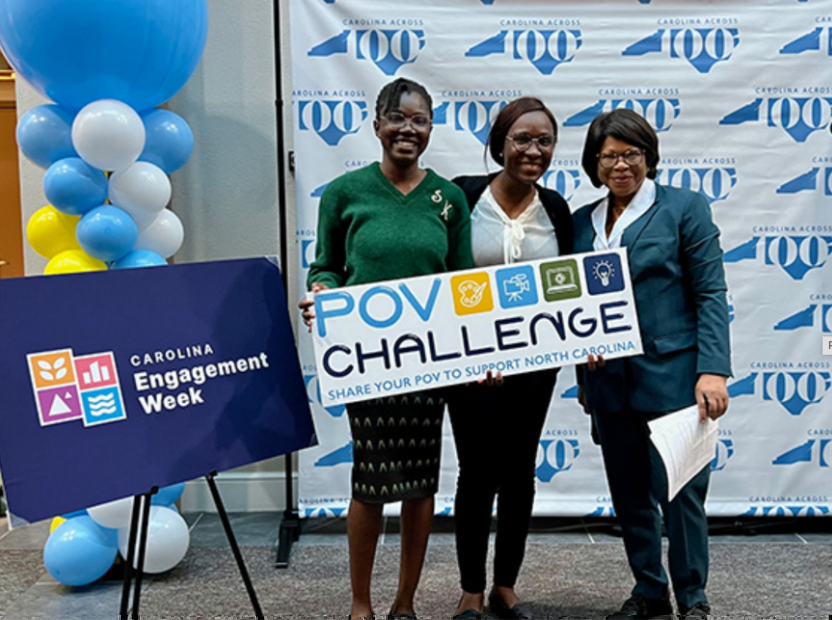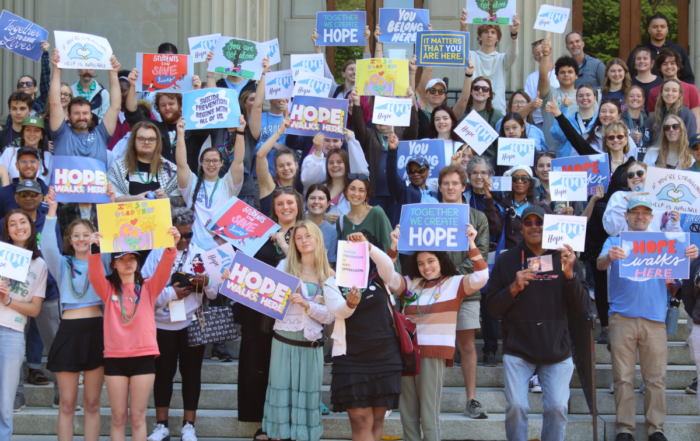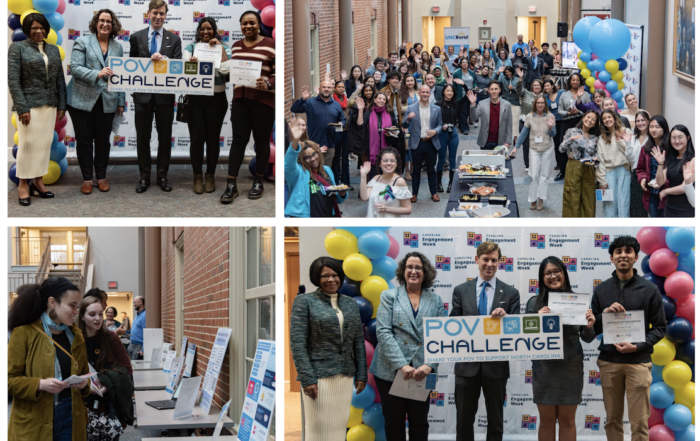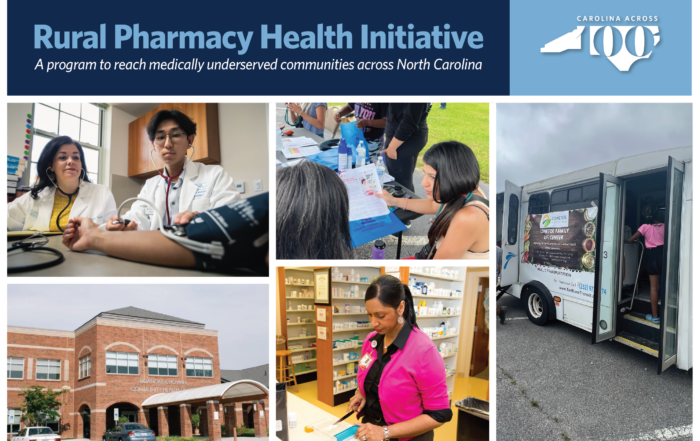Students
Reflections from Sena Kpodzro and Vanessa Akosah
by Sena Kpodzro and Vanessa Akosah
February 12, 2024
The 2023 POV Challenge: How Conversations Shifted Mindsets
To better understand our engagement with the Carolina Across 100 POV Challenge, we would like to invite you to imagine the following scenario:
Vanessa and Sena are two Gillings Masters of Public Health (MPH) students from Ghana who love to have hour-long conversations about school, work, family, faith, food, and everything that crossed their paths during the week! For many MPH students at Gillings, the Spring of the first year is extremely busy. Vanessa and Sena take their conversations as an opportunity to be fully present, a practice that has now become one of Sena’s favorite things. When Sena first came across the POV Challenge, she was determined to have Vanessa on her team, even though their workloads were at an all-time high. Just like all their other conversations, Vanessa and Sena saw an opportunity to be fully present in something outside the classroom.
Sena’s Prespective
Hi, my name is Sena. In early Spring 2023, while enrolled in a program planning course for Global Health, my classmates and I chose adolescent farmworkers in Eastern North Carolina as our priority population. That was my first exposure to learning deeply about a fraction of the youth population in N.C. The Carolina Across 100 POV Challenge provided an opportunity to further engage with this topic beyond the classroom.
And this was how it played out when I approached Vanessa about forming a POV Challenge team:
However, we had a lot to gain. “Every challenge thrown at you is an opportunity to grow your person.” The rest, they say, is history.
“Every challenge thrown at you is an opportunity to grow your person.”
Sena and Vanessa
We signed up for the competition and got to work with no prior understanding or knowledge of who Opportunity Youth were. Were Opportunity Youth those with more opportunities than others? Did they have better outcomes than others? Who exactly comprises this group of people?
We dug in and surprisingly, we came to find out that the 141,000 Opportunity Youth in North Carolina encompassed those between the ages of 16 and 24 who were neither in school nor employed full or part-time. This group of individuals, with diverse talents and backgrounds, are unable to reach their full potential without an education or a form of income. Our research also showed us that historical and structural racism account for a significant part of these barriers and outcomes.
We shared through a podcast what we had learned about N.C. Opportunity Youth and started drawing out similarities and differences with our own experiences in Ghana, all while getting more comfortable with hearing ourselves on a recording! Submitting a purely audio-based product was a no-brainer for us (remember our love for conversations?!). Our biggest concern was not being able to capture all the wonderful findings about Opportunity Youth in NC in less than our typical hour.
Early in our research, we encountered the term “Disengaged youth.” We explored this and quickly realized that it was the name formerly given to Opportunity Youth. The reframing of the label given to this unique group of individuals also began to impact the way they saw themselves, the way society viewed them, and the hope that it brought to those who sought solutions with Opportunity Youth. It considerably heightened the resilience of Opportunity Youth – not just as young adults notin school or working, but as individuals facing significant personal systemic barriers who have experiences, skills, and talents going unrecognized.
Framing is everything. It impacts how innovations we create can disrupt different systems. The appropriate framing resonates most with persons who are most impacted and with individuals who also possess a considerable amount of power to effect the necessary change. It causes power to truly change hands- into the hands of Opportunity Youth! They could realize their own potential because someone (including you and the system!) believed in their abilities. Many of the Opportunity Youth that bounced back had indeed been given opportunities to reintegrate and be engaged in society once again.
“This was beyond a competition, it was a mindset redirection exercise we are glad to have been given the opportunity to be a part of.”
Going through this challenge was enlightening for us as the situation back home in Ghana is similar. We began to consider deeply which opportunities have been created for Ghanaian youth in similar situations through our usual long conversations where the idea of a podcast emanated from! This was beyond a competition, it was a mindset redirection exercise we are glad to have been given the opportunity to be a part of.
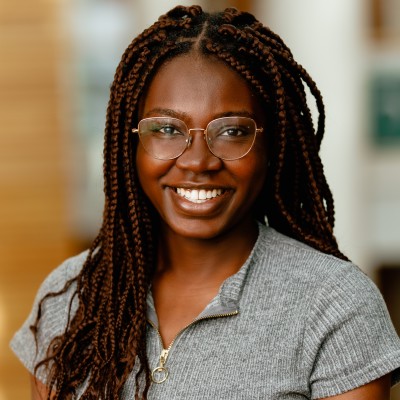
Sena Kpodzro is a second-year MPH student, a Graduate Research Assistant at Gillings, and a Research Fellow with FHI 360.
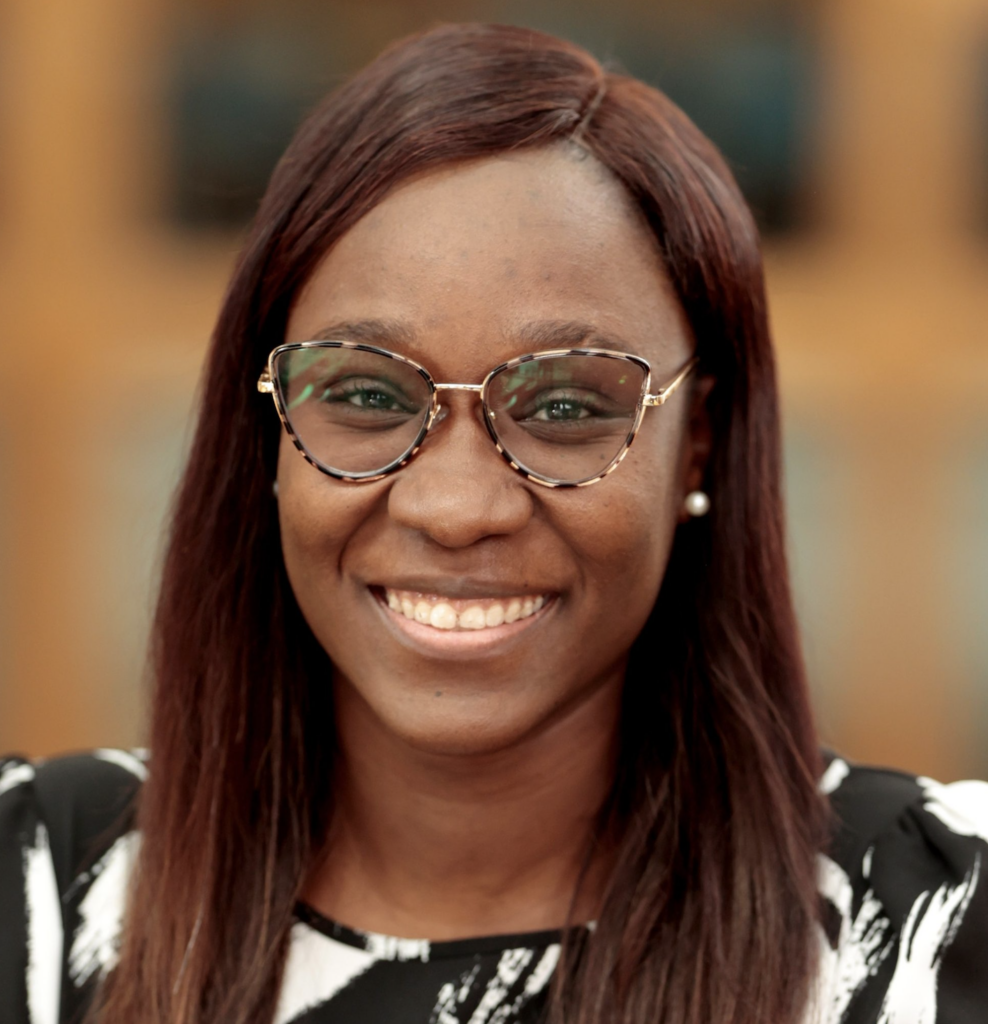
Vanessa Akosah is an MPH candidate (Leadership in Practice). She serves as a Graduate Teaching Assistant with the Public Health Leadership Program and a Graduate Research Assistant with the School of Social Work (Children’s Data Network).


